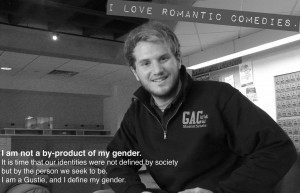During the January interim period, plans for the Gender Bender campaign were finally put into action. These plans had been in the works since the beginning of the 2011-2012 school year. Back in the fall semester, Junior Social Studies Teaching Major Josh Connell had the idea of dispelling gender stereotypes on the Gustavus campus. The fruits of his efforts, along with numerous other individuals who participated in the campaign, will be seen all across the campus in the form of various posters with statements regarding the boundaries of gender stereotypes. There will also be a video, released later into the spring semester as anti-sexist speaker, author and film-maker Jackson Katz comes to speak at Gustavus.
“The goal of the campaign is to expand people’s perspective on gender,” Connell said. “The purpose was to make people more comfortable with identifying themselves outside gender stereotypes and breaking the gender mold a little bit.”

The campaign consisted of students who volunteered from different organizations and clubs across campus. These volunteers took photographs of other students willing to make a statement about their own gender that went against the gender stereotype.
“We got interested students together and envisioned what we wanted to change about campus culture regarding gender,” Connell said. “We laid out a couple goals regarding how we wanted to change the campus outlook. From there, we set goals and envisioned how the posters could look.”
Connell and volunteers tabled outside of the cafeteria, emailed different groups and got friends involved in their project to envision images and statements that challenge the gender stereotype.
“One of the greatest thing about the whole campus was the creativity people brought to it. People jumped on. It started out as wanting to launch posters across campus. The participation and poster-making process made people think about their identity and some of the pictures and statements that people generated were really amazing,” Connell said.
First-year Mara LeBlanc, one of the principle organizers of the campaign and one of the main photographers and poster editors, started with the Gender Campaign from the very beginning, when plans for the Gender Campaign were just budding.
“We had a couple meetings where five people showed up, but more people started getting involved from those very first few people who were initially involved,” LeBlanc said. “The campaign spread through word of mouth—friends recruited friends. Anywhere around thirty Gustavus students participated in the process of making posters.”

A second component to the campaign comprised of tabling outside the cafeteria with two whiteboards, markers and a camera to take photos of individuals speaking out about gender boxes that they don’t fit inside. Many Gusties stopped and took a moment to help the cause.
“We asked people what kind of things they do that they shouldn’t do—based on gender stereotypes. It’s a way for students to show how they don’t fit into gender boxes that they’re placed into. As men and women at school, they’re able to defy what people tell them what they’re supposed to act as or what they’re supposed to like.”
Sophomore Communication Studies Major Pa Moua, another member of the campaign since the beginning, made it a personal choice to become involved when Connell first pitched the idea to MPACT, among other organizations.
“For me, I joined the campaign because I know someone who really struggles with their gender and constructs himself through the stereotypes of being male,” Moua said. “It was very personal for me because my sister had a boyfriend who would beat her. He couldn’t be compassionate toward people without having the need to feel like his gender painted him to be that way. I talked to him and realized he just needed to understand that he didn’t need to be put in that gender role. He had to be the one in control. That’s why I think it’s important that gender isn’t restricted to just what we make it out to be.”
Although the campaign is aimed for the general public of the Gustavus campus, not many people will consciously choose to make it an effort to think about gender stereotypes.
“People don’t really think about gender because it’s a very powerful thing—it’s so embedded in our culture and our minds to put gender on things,” Moua said. “Take a second to think about why something has to be a certain way for a boy or girl. The action of doing this limits people from doing what they want do and expressing who they really are.”
As a third, and final component of the Gender Bender campaign, a video will be created of Gusties holding up whiteboards with statements. This video will be launched later in the spring semester, with its central focus on the historical perspective of gender at Gustavus over the years and taking a look at how far gender has come. In the hopes of challenging students to rethink how they see gender and accepting an open view about what it means to be male or female, the video will also depict how much farther the campus itself can take the role of gender.
I don’t think gender stereotypes are that big of a problem.
Dempsey Schroeder ‘014, who lives in Rundstrom 218
the sex of a baby comes from the dad’s genes. Is there more boys or girls in his family? That will dtmereine whether or not you will concieve a girl or not.
having me as a guest to ucsidss campus safety. PAVE has partnered with Security On Campus for the Safe Campus, Strong Voices campaign. You can also sign up for action alerts and newsletter on PAVE’s website:
Inspiring